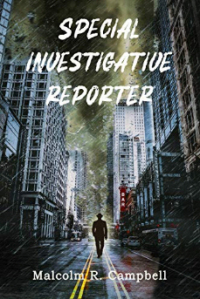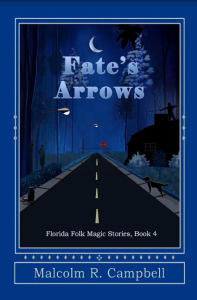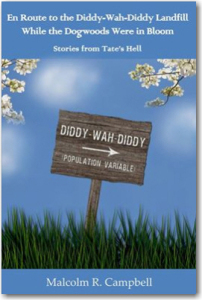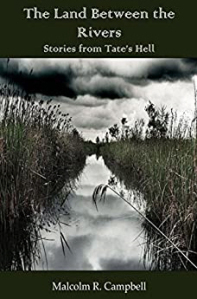Malcolm R. Campbell's Blog, page 76
May 23, 2021
I consider Roe v. Wade Settled Law
Of course, it isn’t.
 Now a new abortion case is approaching the court from Mississippi. The state now bans abortions after 15 weeks. This time scheme is purportedly based on when the fetus would be viable outside the womb. With advances in medicine, we might be approaching the time when abortions are banned before a woman could reasonably know she is pregnant–some suggest banning abortions as soon as it’s possible to detect a fetal heartbeat.
Now a new abortion case is approaching the court from Mississippi. The state now bans abortions after 15 weeks. This time scheme is purportedly based on when the fetus would be viable outside the womb. With advances in medicine, we might be approaching the time when abortions are banned before a woman could reasonably know she is pregnant–some suggest banning abortions as soon as it’s possible to detect a fetal heartbeat.
My political/moral views are somewhat eclectic, but the libertarian side of my beliefs is that government has no right to tell me what I can eat, smoke, drink, worship, think, believe in, do to/for myself (including taking my life), or–if I were a woman–whether or not I could end my pregnancy.
Certainly, as a man, I cannot support anyone–especially men–who believe they have the right to get involved in a woman’s personal choices, including giving birth.
I have long feared the day when the government would try to justify getting involved in the lives of pregnant women, dictating what they can and cannot do once the pregnancy is discovered. That is, making a list of forbidden activities that could harm a baby and/or charging women with murder if a life choice can be proven to have harmed a baby.
So many people argue against abortion due to their religious beliefs. I see this as arrogant and irrelevant. In a country that supports freedom of religion we cannot help but support freedom from other people’s religions. In short, the law cannot base its restrictions on what one (or more) religions restrict simply because we cannot apply a religion’s beliefs to people who are not part of that religion.
Now there is talk again about adding more justices to the Supreme Court. That only works for us if we like the current philosophy of the court–or if we don’t. FDR tried this and we often laugh about it now. But now people are actively thinking about trying it again. Where will that end? Will we one day have a court with more members than the Senate?
Sure, three more liberal justices might do the trick for now to prevent the Court from modifying or overturning Roe v. Wade. A short-term gain, to be sure, but probably a very bad road to travel, long term.
The public’s view about abortion shifts over time, though I would like to see a higher percentage of people in surveys stating neither “pro” or “con” but “none of my business.” When people believe it is their business, they are–in my view–saying that they don ‘t really believe in freedom and that they want government to ban the freedoms they don’t like.
Our first right, I think, is to be left alone and not have one level of government or another lurking like a vulure that will swoop down on us when some person or some group thinks they’re entitled to make us live according to their belief system rather than our own.
–Malcolm
May 22, 2021
BRIEFLY NOTED: American Rose: A Nation Laid Bare: The Life and Times of Gypsy Rose Lee
I have no idea why it took me nine years to get around to reading Karen Abbott’s detailed, well-written, and a dripping-with-atmosphere book about Gypsy Rose Lee (1911-1970). I enjoyed the book, partly because of the nostalgia of vaudeville and burlesque that I heard about years ago when watching The Steve Allen Show, Johnny Carson, and other programs that often featured older performers who got their start in the older art forms. The use of the word “art” here depends on who you’re talking to.
There’s an old theater I know that once featured Vaudeville acts that’s being restored and serves its community by using its facilities for regional theater groups. On several occasions, I’ve asked the management why their website says absolutely nothing about the Vaudeville performers who appeared there during its heyday. They said the old posters and records would require a grant to compile. Get one, I said. Don’t let this slide because without displaying what happened there in the old days, your theater is without most of its heart.
If you saw the 1962 film “Gypsy” (that grew out of Gypsy’s 1957 autobiography), you were exposed to a cleaned-up version of the real story. I liked the movie, especially the performances by Rosalind Russell and Natalie Wood. But compared to Abbott’s book, the movie is a mere hint about the realities of the heart and soul of Vaudeville and burlesque–and the hopefuls, stars, gangsters (and other denizens) who made the system work.
From the Publisher:
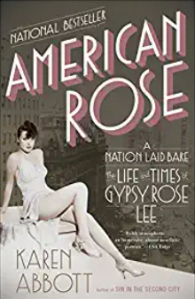 America was flying high in the Roaring Twenties. Then, almost overnight, the Great Depression brought it crashing down. When the dust settled, people were primed for a star who could distract them from reality. Enter Gypsy Rose Lee, a strutting, bawdy, erudite stripper who possessed a gift for delivering exactly what America needed. With her superb narrative skills and eye for detail, Karen Abbott brings to life an era of ambition, glamour, struggle, and survival. Using exclusive interviews and never-before-published material, she vividly delves into Gypsy’s world, including her intense triangle relationship with her sister, actress June Havoc, and their formidable mother, Rose, a petite but ferocious woman who literally killed to get her daughters on the stage. Weaving in the compelling saga of the Minskys—four scrappy brothers from New York City who would pave the way for Gypsy Rose Lee’s brand of burlesque and transform the entertainment landscape—Karen Abbott creates a rich account of a legend whose sensational tale of tragedy and triumph embodies the American Dream.
America was flying high in the Roaring Twenties. Then, almost overnight, the Great Depression brought it crashing down. When the dust settled, people were primed for a star who could distract them from reality. Enter Gypsy Rose Lee, a strutting, bawdy, erudite stripper who possessed a gift for delivering exactly what America needed. With her superb narrative skills and eye for detail, Karen Abbott brings to life an era of ambition, glamour, struggle, and survival. Using exclusive interviews and never-before-published material, she vividly delves into Gypsy’s world, including her intense triangle relationship with her sister, actress June Havoc, and their formidable mother, Rose, a petite but ferocious woman who literally killed to get her daughters on the stage. Weaving in the compelling saga of the Minskys—four scrappy brothers from New York City who would pave the way for Gypsy Rose Lee’s brand of burlesque and transform the entertainment landscape—Karen Abbott creates a rich account of a legend whose sensational tale of tragedy and triumph embodies the American Dream.
“Mother was,’ June thought, ‘a beautiful little ornament that was damaged.’ Her broken edges cut her daughters in ways both emotional and physical, and only sharpened with age.”
“And truth is malleable, something to be bent or stretched or made to disappear, but direct lies always find the path back to the one who tells them.”
“Later, the sisters would remember things differently, as sisters do, old grudges and misunderstandings refracting each memory, bending them in opposite directions.”
From the Critics:American Rose is a fitting tribute to an amazing woman, telling her story beautifully while revealing as much about post-Depression America as it does about celebrity life. It’s cultural history at its best.”—Rebecca Skloot, New York Times bestselling author of The Immortal Life of Henrietta Lacks
“Abbott creates a brainy striptease similar to the one her subject may have performed.”—Newsday
“With staggeringly in-depth research . . . Abbott composes a story wrought with personal drama and insight into a dark era in American history. . . . The story is as beguiling as it is timeless.”—Elle
–
The book takes you into the heart of things Vaudeville and burlesque, and we find that it’s not as pure as we wish it were, nor as kind. But the grit is a large part of the story, one worth telling and one worth reading about and ya gotta love it in spite of its worst sins, for it was a heady time, the roaring twenties when everyone was pushing the envelope.
–Malcolm
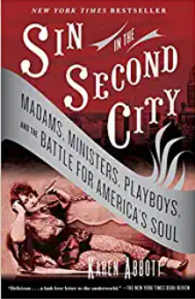 You may also like.
You may also like.
Malcolm R. Campbell
Publisher: Thomas-Jacob Publishing
May 21, 2021
Gosh, how bad is my memory?
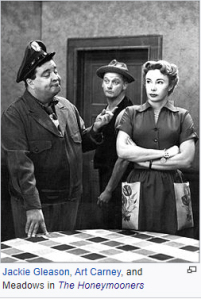 I seem to remember most things. But reality and my memory often diverge greatly when I think back to old TV shows that seemed like they were on for years that were, in fact, hardly on at all in spite of their great followings and influence. Two of my favorite shows were “The Honeymooners” and “Fawlty Towers.” I thought they were on forever, say, like “Grey’s Anatomy” or the “Johnny Carson Show.”
I seem to remember most things. But reality and my memory often diverge greatly when I think back to old TV shows that seemed like they were on for years that were, in fact, hardly on at all in spite of their great followings and influence. Two of my favorite shows were “The Honeymooners” and “Fawlty Towers.” I thought they were on forever, say, like “Grey’s Anatomy” or the “Johnny Carson Show.”
“Fawtly Towers” aired in 1975 and 1979 with a total of 12 episodes. “The Honeymooners” aired from 1965 to 1970 with a total of 39 episodes, though there were attempts to bring it back later. One of my favorite cartoons during the last several years showed astronauts exploring the moon and coming across a body. One of them says, “It’s Alice Kramdem.” The show had a lasting impact for a cartoonist to think of that and for people to know what it meant.
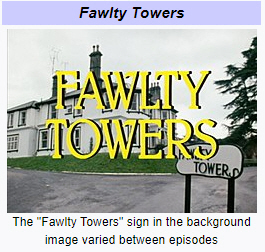 Looking at how I turned out, I’m sure that an entire generation of otherwise sane individuals was warped silly by its exposure to these shows. I’m pretty sure that “Twin Peaks” and “Lost” probably put more viewers into asylums, but Jackie Gleason and John Cleese probably had a lot of questions to answer about the impact of their shows on our sanity when they reachers the Pearly Gates.
Looking at how I turned out, I’m sure that an entire generation of otherwise sane individuals was warped silly by its exposure to these shows. I’m pretty sure that “Twin Peaks” and “Lost” probably put more viewers into asylums, but Jackie Gleason and John Cleese probably had a lot of questions to answer about the impact of their shows on our sanity when they reachers the Pearly Gates.
Do you ever get the feeling after watching a TV series or feature film that you are warped for life. Not only that, but the series or the film seems longer than it was or, worse yet is still going now every time your turn off the light and fall asleep? You leave the TV on in hopes that it will drown out the recurring dream, but still, you hear:
Sybil Fawlty:
[on the phone] I know… I know… I know… Oh, I know!
Basil Fawlty:
Then why is she telling you?
My theory, especially with shows like ‘Twin Peaks” and “Lost,” is that the writers got drunk and/or addicted to heroin and lost track of what they were doing. The thing is, you get addicted along with the writers and the stars. Being addicted means you are lost to the real world and are hopelessly stuck inside the minds of Mark Frost and David Lynch or John Cleese and Connie Booth.
So time becomes fluid, like bad booze in a sordid bar in New Jersey. You wonder if all these people are in your closet or under your bed. They probably are. But they’re part of your life now even if your memory of how they got there is a bit shabby.
–Malcolm
Publisher: Thomas-Jacob Publishing
I might have been drunk and/or addicted to heroin while writing this novel, so it might just get stuck in your dreams. You have been warned.
May 20, 2021
You’d think a writer would be good at Scrabble
I lose most of the “Words with Friends” games I play on Facebook because I just can’t see prospective words in a pile of letters. I was never very good at the original Scrabble with the wood tiles. I wonder if they’re made out of plastic now. I’m sure I’d be doubly bad at the various sanitized versions of Scrabble that are weeding out words that aren’t politically correct.
 There’s a joke floating around Facebook that shows an Ikea-style, assemble-it-your-self novel that arrives on your doorstep as a box of letters. I get nightmares thinking about it it.
There’s a joke floating around Facebook that shows an Ikea-style, assemble-it-your-self novel that arrives on your doorstep as a box of letters. I get nightmares thinking about it it.
I can’t speak for other writers, but I have never viewed words as collections of letters that must be assembled into what I want to say. I think of the word first and then type the letters without really noticing them. So Scrabble is the exact opposite of how my mind works. It’s embarrassing, though, because people who see writers as wordsmiths expect them to be impossible to defeat in a game about words.
I console myself by thinking that most carpenters and others who create miracles out of wood know little or nothing about the building blocks of matter. If you gave them a box of protons, neutrons, and electrons, they probably couldn’t turn them into a birdfeeder or a table. They’d be even more lost if the box contained quarks and other elementary particles.
Most craftspeople don’t make their raw materials from scratch. Writers don’t either. This is my excuse and naturally, I’m sticking to it with the determination of a covalent bond.
–Malcolm
Publisher: Thomas-Jacob Publishing
The ending I did not see coming! You think you know somebody then BAM, right out of left field it knocks you for a loop! I found Fate’s Arrows well told with several threads woven together to make it an encompassing tale of the era. It’s raw and fraught with danger. The Klan may operate differently these days, but it is still alive and well. – Big Al’s Books and Pals
May 19, 2021
First rule: love your stories’ locations
This is a book that packs a lot into its 166 pages. Despite this bleak subject matter the book is beautifully written, allowing this Brit a vision of a place which the author knows well and clearly loves. The contrast of the natural beauty highlights the ugliness of human behaviour. – Zoe Brooks review of “Conjure Woman’s Cat”
One of the greatest compliments a writer can receive from a reader or a reviewer is an acknowledgment of his or her love for the novel or short story’s place setting. To love a place unconditionally means accepting its beauty along with its flaws. When I think of a place, I think first about the land whether it’s swamps and marshes or glacier-carved mountains and pristine blue lakes.
[image error] Pitcher plants in Florida’s Tate’s Hell ForestExperience helps supplement an author’s research. I lived in the Florida panhandle from the first grade through college. Family day trips, Scout camping trips, and recreation in various places shows an author what the guide books and maps miss: your perspective through first-hand research.
Quite often, this first-hand experience teaches you about the land’s history, myths, ghost stories, and folklore, all of which become a part of you and your view of life in that place which is much more real than picking a place on the map and then looking up its myths and folklore on Wikipedia or Amazon.
As people say, a map is not the territory. Robert Pirsig, in Zen and the Art of Motorcycle Maintenance, said that riding through the countryside and seeing it through your car windows was pretty much like watching TV. You’re in your car, maybe on an Interstate racing toward your destination at 75 mph. Suffice it to say, you’re not really at any of the locations alongside the road. To know the location, you have to live there or explore it on one or more extended vacations. This way, you come to know and love the land–or you decide it’s not your kind of place.
If you love the land, it takes part in shaping you just as surely as a spouse. If you don’t love the land, then you’re either unhappy in that place or you try to ruin the land to suit your needs. If the land has, in part, made you who you are, this fact will be obvious to the readers of your work and–like you–the characters in your work who live there.
Good fiction, I believe, depends on recognizing the importance of the land on your plot, characters, and theme.
–Malcolm
Publisher: Thomas-Jacob Publishing
May 18, 2021
Sin Taxes: do they violate the separation between church and state?
If you have arrived at this post today expecting high-quality research, you’re in the wrong place.
Basically, federal and state governments levy sin taxes on anything remotely harmful that will nonetheless bring money into the coffers. The government prefers to call it an excise tax to cover up the notion that sin taxes are really a religious matter. In some countries, government and religion are the same thing, while in the U. S., they’re not supposed to be.
 Even so, the government makes a killing off sin taxes because the faithful think sin is wrong even though they drink, smoke, have sex outside of marriage, and other naughty things. This is better than the old days when the government killed people for sinning. In some countries they still do.
Even so, the government makes a killing off sin taxes because the faithful think sin is wrong even though they drink, smoke, have sex outside of marriage, and other naughty things. This is better than the old days when the government killed people for sinning. In some countries they still do.
It seems to me, that sin taxes ought to apply only to members of churches that believe a certain activity or purchase is sinful. Non-members basically have a get-out-of-hell-free card except in those countries that still charge people with heresy who are not members of the religion in vogue.
This idea might decrease church membership. On the other hand, it could be the start of churches that aren’t paternalistic, that don’t have long lists of things we’re not supposed to do–like dancing, for example. I’ve always liked the idea of a sect called The Church of What’s Happening Now. It’s kind of a different strokes for different folks approach to the Creator who, at present, isn’t getting a cut of the so-called sin taxes.
The best short-term approach is to make sin taxes optional. When you walk into a liquor store or a grocery store that sells wine and beer, you should be handed a form that asks if you believe the liquor you’re buying is sinful to drink. If you answer “yes,” you pay the price. If you answer “no,” you get (more or less) 50% off the price on the label.
It’s the right thing to do. None of us should be forced to pay for sins we don’t believe in.
–Malcolm
Publisher: Thomas-Jacob Publishing
The animals are lucky. They don’t have to worry about sin or sin taxes.
May 17, 2021
Where were you last Friday at 3 p. m.?
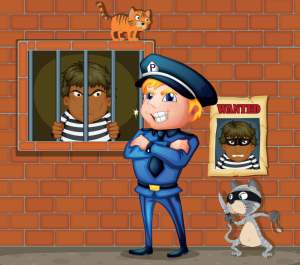 Don’t you just hate it when a police detective asks you a question like that? My first thought would probably be, “Uh oh. I need an alibi for something, probably something bad.” In “real life,” I wouldn’t have a clue even though suspect characters in police dramas seem to have a clock inside their heads that remembers, “No, yeah, I was drinking sidecars with Bill Smith and Bob’s bar on 79th street.”
Don’t you just hate it when a police detective asks you a question like that? My first thought would probably be, “Uh oh. I need an alibi for something, probably something bad.” In “real life,” I wouldn’t have a clue even though suspect characters in police dramas seem to have a clock inside their heads that remembers, “No, yeah, I was drinking sidecars with Bill Smith and Bob’s bar on 79th street.”
No worries, though, I’m not a cop. According to WordPress statistics, a fair number of you were reading this blog last Friday at 3 p. m. Why I wonder.
Did you just get home from school?Did you wake up from last night’s drunk (all those sidecars with Bill Smith)?Did you get bored staring out the windows of your corner office on the penultimate floor of a downtown office building where workers assumed you were making important decisions on behalf of the company?On the other hand, there might be positive, less frivolous reasons why you were here last Friday at 3 p. m.
You were looking for information and didn’t want to go to one of those websites with a paywall there it costs $45/hour to read something that only a person with 25 PhDs can understand.Reading my words has become a religious experience; no drugs or costumes required.You keep hoping I’ll blurt out the endings of my novels so you have an “edge” for the book report in Mrs. Johnson’s 4 p. m. English 401 class.Quite possibly, you’re stalking me because you think that, as a writer, I have $10000000000000 in my checking account. If so, you’re wasting your time. Most writers, not counting people like James Patterson, don’t make enough off their writing to pay the bills. But it’s flattering if you think that I do.
Frankly, I’m happy you stopped by even if it wasn’t on a Friday at 3 p.m. Of course, reading my blog isn’t much of an alibi. But then most of us don’t need an alibi. We don’t, do we?
–Malcolm
Malcolm R. Campbell
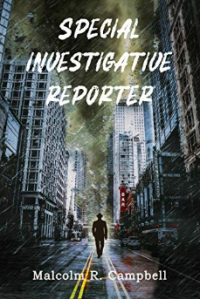 Publisher: Thomas-Jacob Publishing
Publisher: Thomas-Jacob Publishing
If you like satire, “Special Investigative Reporter” is the novel for you. Have a friend take a picture with a date/time stamp of you reading it in case you need an alibi.
May 15, 2021
‘The Reporter Who Knew Too Much,’ by Mark Shaw
Those who knew her work, including Ernest Hemingway, said that Dorothy Kilgallen was the best female reporter in the business, perhaps the best of either sex and one of the most powerful people in the country when her life suddenly ended on November 8, 1965.
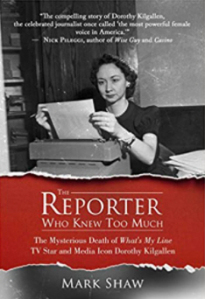 She was known for her “Voice of Broadway” column that appeared in Hearst’s New York Journal American and was syndicated to newspapers across the country, she was a popular panelist on “What’s My Line” for many years, and she covered major news stories including the Sam Sheppard murder trial (“The Fugitive”) and the Kennedy Assassination. She was the only reporter allowed to interview Jack Ruby.
She was known for her “Voice of Broadway” column that appeared in Hearst’s New York Journal American and was syndicated to newspapers across the country, she was a popular panelist on “What’s My Line” for many years, and she covered major news stories including the Sam Sheppard murder trial (“The Fugitive”) and the Kennedy Assassination. She was the only reporter allowed to interview Jack Ruby.
Many said that she broke the “glass ceiling” that allowed women reporters to take their rightful place in the press corps.
Newspapers reported her death as an accidental drug/alcohol overdose. However, the tox screen showed two drugs in her system (in addition to the prescribed Seconal for sleep) that were not prescribed and not even in the house. The M.E. report was a horrible mess, the death scene (her house) got no forensic workup, and there was no police investigation. Those who know these details and the fact she was receiving death threats believe she was murdered, most like due to her determined investigation of the Kennedy/Oswald deaths that she was apparently close to solving.
The book presents a brief biography of Kilgallen and then focuses on her investigative work, the people she came in contact with as a reporter, a list of those with motives to silence her, and the perplexing details of her final hours and who might have spiked her drink and possibly gotten into her house to arrange the crime scene. There were two glasses on the nightstand. One included the residue of a narcotic she did not take, yet neither glass nor the surrounding area was checked for fingerprints.
While the writing and organization of the book are a bit uneven, it presents useful information for those who followed Kilgallen’s career. Shaw hopes that the information he has uncovered will prompt officials to re-open the case. Sadly, the family is not co-operating.
On a personal note, I was stunned when she died and always thought there was something fishy about it and the fact that–in spite of the tox screen–no police investigation followed. I liked her work as a journalist and saw her every week on “What’s My Line” (still available on YouTube) where she asked questions the way a reporter would. Some said panelist Arlene Francis was the good cop and Kilgallen was the bad cop. Francis was a regular on the show for 25 years, Kilgallen for 15 years.
The FBI (including director Hoover) did not like her. The mob did not like her. Her husband did not like her. That’s not an easy place to be.
–Malcolm
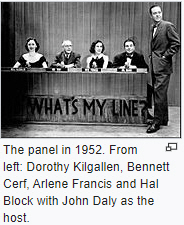 Malcolm R. Campbell
Malcolm R. Campbell
Publisher: Thomas-Jacob Publishing
May 14, 2021
The Floo’ers o’ the Forest
 The Battle of Flodden, Flodden Field, or occasionally Branxton, (Brainston Moor[4]) was a battle fought on 9 September 1513 during the War of the League of Cambrai between the Kingdom of England and the Kingdom of Scotland, resulting in an English victory. The battle was fought near Branxton in the county of Northumberland in northern England, between an invading Scots army under King James IV and an English army commanded by the Earl of Surrey.[5] In terms of troop numbers, it was the largest battle fought between the two kingdoms. – Wikipedia
The Battle of Flodden, Flodden Field, or occasionally Branxton, (Brainston Moor[4]) was a battle fought on 9 September 1513 during the War of the League of Cambrai between the Kingdom of England and the Kingdom of Scotland, resulting in an English victory. The battle was fought near Branxton in the county of Northumberland in northern England, between an invading Scots army under King James IV and an English army commanded by the Earl of Surrey.[5] In terms of troop numbers, it was the largest battle fought between the two kingdoms. – Wikipedia
If you are of Scot’s descent, as am I, you know about this battle (among others) and the song that reminds us of the misery of those left behind:
I’ve heard the lilting, at the yowe-milking,
Lasses a-lilting before dawn o’ day;
But now they are moaning on ilka green loaning;
“The Flowers of the Forest are a’ wede away”.
As buchts, in the morning, nae blythe lads are scorning;
The lasses are lonely and dowie and wae.
Nae daffin’, nae gabbin’, but sighing and sobbing,
Ilk ane lifts her leglen, and hies her away.
In hairst, at the shearing, nae youths now are jeering,
The Bandsters are lyart, and runkled and grey.
At fair or at preaching, nae wooing, nae fleeching,
The Flowers of the Forest are a’ wede away.
At e’en, in the gloaming, nae swankies are roaming,
‘Bout stacks wi’ the lasses at bogle to play.
But ilk ane sits drearie, lamenting her dearie,
The Flowers of the Forest are a’ wede away.
Dule and wae for the order sent our lads to the Border;
The English, for ance, by guile wan the day:
The Flowers of the Forest, that foucht aye the foremost,
The prime o’ our land are cauld in the clay.
We’ll hae nae mair lilting, at the yowe-milking,
Women and bairns are dowie and wae.
Sighing and moaning, on ilka green loaning,
The Flowers of the forest are all wede away.
Meaning of Scots words:
Yowe=ewe
Ilka=every
Wede=withered
Buchts=cattle pens
Dowie-sad
Wae=woeful
Daffin’=dallying
Gabbin’=talking
Leglen=stool
Hairst=harvest
Bandsters=binders
Lyart=grizzled
Runkled=crumpled
Fleeching=coaxing
Gloaming=twilight
Swankies=young lads
Bogle=peek-a-boo
Dule=mourning clothes
The Scots, I think, were treated like American Indians have been treated: enslaved, language banned, viewed as substandard. You can find the details in many places rather than my trying to capture Scotland’s history in this post. Suffice it to say, I subscribe to my family’s motto: Forget Not. And I don’t.
The U.K., in my unsolicited opinion, doomed the remains of the empire with BREXIT. Now let’s finish the job and move forward with another independence referendum for Scotland and, should that succeed, consider setting Wales free and allowing Ireland to be one, unified country…if the residents there decide that’s what they want.
I follow the news about this and keep hoping for victory. Or, as we might say in Scots Gaelic: Tha mi a ’feitheamh ri Alba an-asgaidh.
–Malcolm
 Forget Not
Forget Not
Malcolm R. Campbell
Publisher: Thomas-Jacob Publishing
May 13, 2021
JFK: we will wonder and always will
If I treated this blog like a newspaper columnist with a daily column, I would say (as “they” do in the theater), “the show must go on.” But I get distracted. This time the distraction is “the fault” of a book about the Kennedy assassination, Lee Harvey Oswald, Jack Ruby, J. Edgar Hoover, the Warren Commission, the “magic bullet,” and various conspiracy theories about what really happened.
Personally, I don’t think we know the truth about what happened. The book I’m reading arrives at the same conclusion. Suffice it to say, I’ve been stuck reading the book and looking up stuff on Google from time to time. I’ll talk about the book later, but I want to finish it first.
 Goodness knows I’ve seen enough fiction and quasi-documentaries about the assassination from Oliver Stone’s work to Jim Garrison’s approach. And then, too, there’s 111/22/63 by Steven King. That novel was freaky enough to make one wonder about the whole thing even if they never wondered about it before.
Goodness knows I’ve seen enough fiction and quasi-documentaries about the assassination from Oliver Stone’s work to Jim Garrison’s approach. And then, too, there’s 111/22/63 by Steven King. That novel was freaky enough to make one wonder about the whole thing even if they never wondered about it before.
I have a feeling that the lack of closure, aside from concrete evidence, comes from the fact that the federal government botched every part of its response beginning with forcibly extracting Kennedy’s body from Parkland Hospital before the M.E. was done, to Hoover’s declaration that Oswald acted alone before he could have known one way or the other, to the slipshod work of the Warren Commission.
People wondered: Is the government scared senseless, completely inept, or pretending to be inept because there’s something going on it wanted to cover-up? And, years from now, will files ultimately be declassified that tell us which of these scenarios is true?
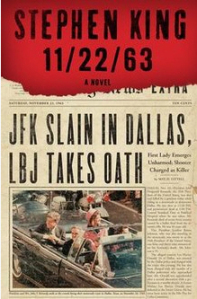 When I was in high school, I read a lot of stories about time travelers heading into the past to try and undo crimes and other unfortunate events in the past. Early on in his genre, people were usually trying to save President Lincoln. Recently, tinkering with the past became more multifaceted on the TV series “Timeless.” King, as readers of 11/22/63 know, sends his main character back in time to try and save President Kennedy.
When I was in high school, I read a lot of stories about time travelers heading into the past to try and undo crimes and other unfortunate events in the past. Early on in his genre, people were usually trying to save President Lincoln. Recently, tinkering with the past became more multifaceted on the TV series “Timeless.” King, as readers of 11/22/63 know, sends his main character back in time to try and save President Kennedy.
When the protagonist returns from the past, he finds the world in one hell of a gosh-awful mess. We can debate, of course, whether or not that mess is a horror story from King’s imagination or the reality we’re currently living in. I don’t believe that gosh-awful mess was likely, so I think the U.S.A and the world would have been much better off if Oswald (or whoever) had missed or had never been in Dallas at all.
So, seeing all the parts to this story again, I was pulled away.
–Malcolm
Malcolm R. Campbell
Publisher: Thomas-Jacob Publishing

